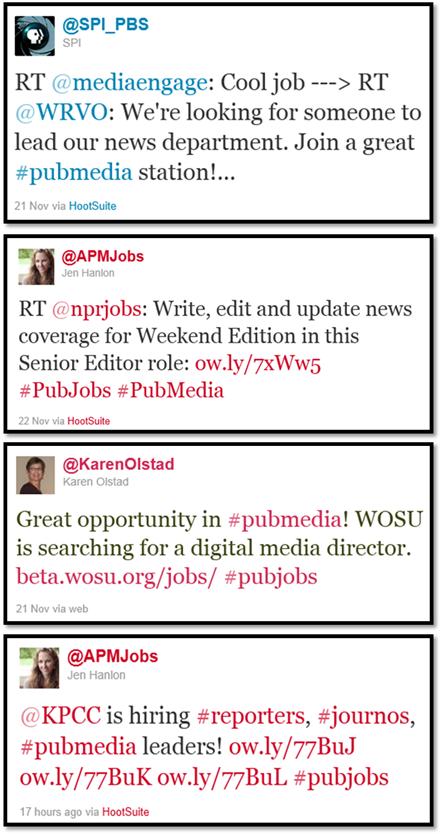Now there’s a headline you don’t see every day. There’s not a whole lot of hirin’ going on anywhere in radio.
Or is there?
We’ve talked to more than a hundred job-seekers in the past few months during this most recent purge, RIF, down-sizing, scale-back, realignment of human resources, or whatever the hell you want to call it. Hundreds of people I’ve never heard of in the radio business have LinkedIn with me. And as many of you know, we’ve even created a “Ready To Rock” page to create an online place where Rock stations can look for new personnel.
But it’s not enough.
The bottom line is that there are fewer jobs in radio, and the trend line shows no sign of reversing. During our conversations with “the displaced,” the topic sometimes turns to “I’m thinking about doing something else.” Now I’m not a head hunter or a career counselor. In some of these discussions, it gets personal. There are family matters, mid-life crises, and other factors where I find myself ill-prepared to counsel or advise.
But I will say this – some of you may be looking in the wrong places or continuing to see the world of radio through a very traditional lens.
There are jobs in radio, but they may not be the same jobs many of you have been occupying over the past few decades.
At Jacobs Media, we’re not hiring. We’re fully staffed with a solid team of pros, most of whom have been with us for ten years or more. Our hire of Lori Lewis earlier this year is a sign that the radio consulting business is moving in a digital direction. Most radio companies are struggling to define, refine, and activate their digital and social strategies. There’s a there there.
But at jacAPPS, our mobile apps division, it’s a different story. As we celebrated our third anniversary a few weeks ago, we’re at the point where we need to make some decisions. With more than 500 apps developed, we recently found out that we’re the largest mobile app developer in Michigan. Imagine that. We’re in need of a strong salesperson (before you send your resume to Paul, we need someone who can sell with a strong background in digital and preferably mobile). We could use another great developer on our team, too – someone who can write code and has an eye and ear for great mobile marketing.
If neither of these job descriptions sounds like you, I’m not surprised. Not too many people who have worked in radio qualify. That might be a sign that the jobs of the future may not resemble the jobs of the past.
But it also could be an indication that those of you with traditional radio skills may not be looking in the right places. Here’s a case in point. During a quiet moment over the holiday weekend, Paul was perusing Twitter under the #publicmedia silo and ran across these tweets:
Not bad – some good looking positions in central New York, Los Angeles, Columbus, and at some organization that calls itself NPR.
My guess is that most of these require a college degree, and preferably experience in public media. But I know a (growing) number of people working in public radio and television who were once working for Clear Channel, Cox, CBS, and many other traditional broadcasters. It’s a different rhythm to be sure, and for a long-time commercial broadcaster, there are upsides and downsides to making this transition.
But Paul’s twitter feed indicates that public broadcasting is investing in people. And if you’ve checked out the quality of their content lately, it’s pretty damn good in an environment where the struggle to achieve gets harder every day in an industry where mediocrity is so often the norm. You might also want to check out public radio ratings when you get a moment. As tuned-in commercial programmers might tell you, public radio stations are increasingly placing rather high in the 25-54 adult rankers in many markets.
A wiser man than me once advised, “Fish where the fish are.”
Maybe it’s time to get out those rods and reels and try another pond.
- A 2020 Lesson?It Could All Be Gone In A Flash - April 24, 2025
- How AI Can Give Radio Personalities More…PERSONALITY - April 23, 2025
- Can Radio Afford To Miss The Short Videos Boat? - April 22, 2025






On the subject of “fish where the fish are”, I suggest there’s a growing area
in radio that deserves mention. We are placing grads of our program at Detroit and S.E. Michigan stations in what I’ll call Digital/Web based positions. As the Social Media activity increases, several station groups who “get it” are hiring young people to do web content up-dates for their websites, shoot video for them and the many other digital needs they have. The Director of Digital Services for CBS Detroit (6 radio stations & 2 TVs)is a grad as is the their Digital Acct. Exec. Another grad is in a similar position with the Greater Media cluster, and these are just a couple of examples. This has been happening over the past 2 or 3 years and has caused
us to add a large internet/digital component to our course along with our traditional radio/TV training. We think there are fish there!
In case you don’t know, Dick has been in charge of placement at the Specs Howard School of Media Arts (yes, it used to be “Broadcasting”) since back in the transistor radio days. If anyone knows where the fish…er, jobs…are, it is him. Dick, thanks for joining in on the conversation and providing your usual wizened point of view.
Public radio has maintained a healthy growth curve over 20 years as it has assumed a greater role in local, regional and national journalism. Public TV has been shedding jobs over that time. The net total public media workforce (about 20,000) is growing slightly or maybe stalling due to sharp cuts in state budgets. And of course the federal allocation to stations (roughly $120 million to radio, $360 million to TV)is under attack in congress and could lead to more downsizing and consolidations (federal funding provides about an 18% subsidy to the overall system). But Fred’s point is right on — the system invests in people and in quality. I did a lot of hiring during my years as a public radio news director and I saw many candidates apply from outside the system. Some made the transition smoothly, bringing sharply honed skills and a competitive attitude. But more often than not, the unfamiliarity with mission-driven, public service programming proved an ill-fit. Public radio’s rigorous attention to accuracy, completeness and craft can either draw you in or leave you frustrated. So, join the team but be ready to play by different rules.
Thanks for the persepctive, Michael. You cannot maintain the level of quality content that public radio lives up to without great people. Appreciate you participating in the conversation.
I read this particular blog because it popped up in the, “You Might Also Like:” section at the bottom of a more recent post. The content strikes me as being just about as relevant today as it was four years ago. I don’t know if that is a good or bad thing for us radio only guys but it’s an important message either way. Another point for NPR in 2015 is that they have several former staff members who have gone out on their own and created some of the most popular podcasts currently on the market.
Thanks for the great content Fred, you’ve been giving us good stuff for a long time.